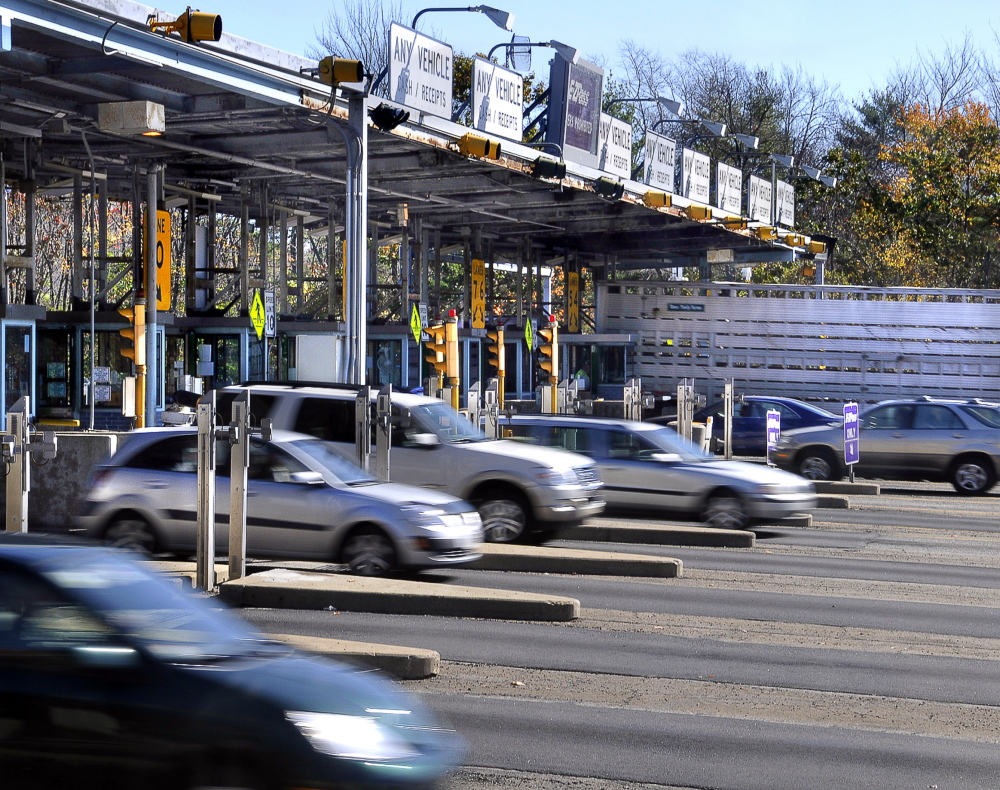YORK — York residents and Maine Turnpike Authority officials sparred again Wednesday over plans to build a new toll plaza on the highway.
Many residents said the project will cause environmental damage and that the turnpike authority hasn’t fully considered an all-electronic collection system. But authority officials said such a system would result in millions of dollars in lost revenue annually.
The turnpike authority held the public hearing in advance of filing state and federal environmental permits to build a $40 million toll plaza a mile and a half north of the existing one. Turnpike authorities are proposing a 15-lane plaza with a mix of cash booths and electronic-pay lanes.
The proposal, at mile 8.8, is the most practical in terms of safety, revenue and reducing traffic on secondary roads, according to the authority. It also has the least environmental impact and disruption to nearby residents, authority Executive Director Peter Mills told a crowd of about 50 residents.
The current toll plaza at mile 7.3 has serious safety and operational problems, and building a new one at the same spot isn’t feasible, the authority says.
An all-electronic toll booth that would charge vehicles automatically either through fee transponders like the EZ pass or by reading license plates and billing drivers through the mail, was considered, but would result in a significant revenue loss and added traffic on secondary roads near York, Mills said.
“The bottom line is that it is impractical to implement (all electronic tolling) on this road,” he said.
The turnpike collected $128.2 million in tolls in 2015, and $39 million, about 30.5 percent, was in cash. The York tolls account for 40 percent of the turnpike’s total cash receipts. Converting to all-electronic collection system would put about $15.5 million a year at risk because some states and Canadian provinces will not identify license plates, allowing some drivers to use the road for free, according to the authority. Other states, including Massachusetts, have had trouble collecting fares from delinquent drivers at its electronic tolls, Mills said.
Added administrative costs and lost revenue would force the authority to double the current toll to $6, which would lead some drivers to use secondary roads and add to local traffic, according to the authority.
Its analysis of electronic tolls will be included in the application to the Army Corps of Engineers, Mills said. It also needs permits from the Maine Department of Environmental Protection.
The planned plaza will have minimal environmental impact and be less disruptive to residents than the current plaza, Mills added.
According to its analysis, construction of the plaza complex would affect 1.5 acres of wetlands and would not harm sensitive vernal pools. There are no impacts to federally-listed threatened or endangered species, according to its studies.
The authority will spend $450,000 on environmental mitigation including a wildlife passage for threatened species on a road in Eliot. Recent studies show there would be little or no harmful air, noise or light impacts on nearby residents. The new toll booth would affect fewer homeowners than the current location, Mills said.
But at the meeting, residents doubted the authority’s findings and raised further concerns about the impact of the project on nearby conservation areas and the environment.
“You’re going to destroy the town of York,” said Kathleen Loane, who lives near the proposed toll booth site.
“You can’t stand there and say you aren’t going to destroy York, why do you think we’ve been fighting this for nine years?” she said.
Others said states had put in electronic toll booths without problems and the authority was focusing on cash instead of looking to a future when electronic fares would be standard.
York Town Manager Stephen Burns said the town and the Think Again Group that has organized against the new plaza were petitioning the Army Corps of Engineers to require an all-electronic toll booth alternative as part of the agency’s permit. Although local issues were important, the authority would be able to get around them, he said.
“We are not going to win that fight,” Burns said. “The real issue is to make sure (all-electronic tolling) is included in the environmental impact.”
But Mills said the authority would never have gone this far with the current plan if it thought an all-electronic plaza was feasible.
“It is very late in the game to ask the turnpike to scrap all it has done,” Mills said.
“It just isn’t an orderly way of doing things.”
Send questions/comments to the editors.




Success. Please wait for the page to reload. If the page does not reload within 5 seconds, please refresh the page.
Enter your email and password to access comments.
Hi, to comment on stories you must . This profile is in addition to your subscription and website login.
Already have a commenting profile? .
Invalid username/password.
Please check your email to confirm and complete your registration.
Only subscribers are eligible to post comments. Please subscribe or login first for digital access. Here’s why.
Use the form below to reset your password. When you've submitted your account email, we will send an email with a reset code.